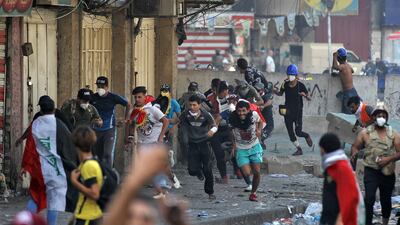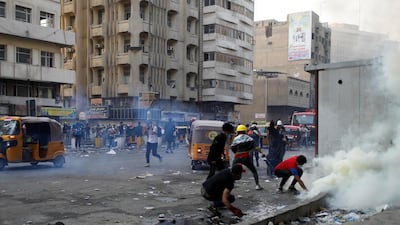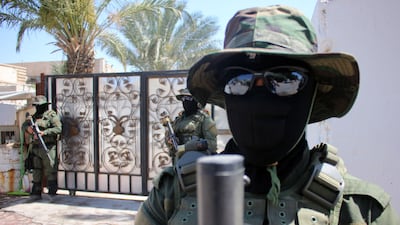The UN has released a report on the Iraqi government’s failure to protect protesters and activists over the course of the more than two years since Prime Minister Mustafa Al Kadhimi took office.
Following a bloody October 2019 crackdown on people protesting widespread government corruption, and a lack of jobs and services, former prime minister Adil Abdul Mahdi stepped down.
His successor, Mr Al Kadhimi, pledged to listen to the demands of demonstrators and ensure they would not be attacked by security forces.
But the violence continued nonetheless: in a report released on Thursday, the UN warned of deadly threats that activists often receive, documenting 26 incidents since May 2021 that it said were “aimed at suppressing dissent and criticism carried out by 'unidentified armed elements'".
The report added that the “environment of fear and intimidation” felt by activists and protesters has put a stranglehold on freedom of expression.
Militia influence
Mr Al Kadhimi’s government is now largely powerless, nearly nine months after national elections failed to produce a new government, leaving the sitting prime minister to contend with squabbling factions and no constitutional right to set the legislative agenda.
He has largely been able to rein in vicious crackdowns by official security forces, including the army and police, which characterised the former government's response to the mass protest movement.
During the crackdown, at least 500 protesters and activists were shot dead in the streets of Baghdad, Najaf, Basra and Nasiriyah — much of central and southern Iraq, where there is a Shiite majority.
As many as 100 others, as highlighted by the UN, have been assassinated since the 2019 protests, and analysts widely blame Iran-backed militias.
This is due to the fact that, for the first time since the US-led invasion in 2003, the mostly Shiite demonstrators focused their anger on Iranian influence on Iraqi politics.
With Iran's backing, the militias responded violently. Ostensibly under Iraqi government control, they are a collection of armed groups in an umbrella organisation called the Popular Mobilisation Forces (PMF).
Many PMF groups were accused of sectarian violence against civilians during the US occupation.
Since 2018, when protests over poor water and electricity supplies erupted in Basra, they have frequently been accused of killing activists.
Senior leaders of PMF groups, including Qais Al Khazali and the now deceased Abu Mahdi Al Muhandis, made frequent public threats of violence against demonstrators, accusing them of being supported by foreign powers.
Failed crackdowns
Mr Al Kadhimi has reason to push back against the PMF, having lost a former adviser, Hisham Al Hashemi, in an assassination that has been blamed on an unnamed Iran-backed group.
After the killer was arrested, Iraqi officials said he was a member of one of the militia groups that had infiltrated the police.
The UN report looked at the fallout from Al Hashemi’s killing and the subsequent trial of the killer.
After repeated delays, the trial has again been postponed — this time with no new start-date — “due to the 'inability of bringing the defendant to the court'", the report added.
Targeted killings
Mr Al Kadhimi’s moves to rein in the militias, which have also launched numerous attacks on coalition forces and Iraqi intelligence officials, have been met with strong pushback.
His residence was attacked with an explosive drone in November and his political allies also became the targets of assassination attempts after he ordered the arrest of several PMF commanders.
Among the 26 cases investigated, the UN report includes “one targeted killing, three attempted targeted killings, five violent assaults, one house raid, 14 attacks using improvised explosive devices [and] one abduction”.
It refers to the “persistent impunity with respect to targeted attacks against protesters” as well as against people “seeking accountability for these attacks, and activists and critics espousing views critical of armed elements and affiliated political actors”.
The report, focusing on the period of May 2021 to May 2022, is based on 27 interviews, including with judicial officials in Baghdad and southern Iraq. It was compiled by the UN's Office of the High Commissioner for Human Rights (OHCHR) and the UN Assistance Mission for Iraq (Unami).
The report notes, however, that “significant progress” has been made in providing compensation to the families of those killed during the protests.
More than 500 families have received compensation of about $7,000 dollars each, it said.
The UN said that while the Iraqi government has held some security force members to account, not enough is being done — something that could embolden more killers.
What is blockchain?
Blockchain is a form of distributed ledger technology, a digital system in which data is recorded across multiple places at the same time. Unlike traditional databases, DLTs have no central administrator or centralised data storage. They are transparent because the data is visible and, because they are automatically replicated and impossible to be tampered with, they are secure.
The main difference between blockchain and other forms of DLT is the way data is stored as ‘blocks’ – new transactions are added to the existing ‘chain’ of past transactions, hence the name ‘blockchain’. It is impossible to delete or modify information on the chain due to the replication of blocks across various locations.
Blockchain is mostly associated with cryptocurrency Bitcoin. Due to the inability to tamper with transactions, advocates say this makes the currency more secure and safer than traditional systems. It is maintained by a network of people referred to as ‘miners’, who receive rewards for solving complex mathematical equations that enable transactions to go through.
However, one of the major problems that has come to light has been the presence of illicit material buried in the Bitcoin blockchain, linking it to the dark web.
Other blockchain platforms can offer things like smart contracts, which are automatically implemented when specific conditions from all interested parties are reached, cutting the time involved and the risk of mistakes. Another use could be storing medical records, as patients can be confident their information cannot be changed. The technology can also be used in supply chains, voting and has the potential to used for storing property records.
Brief scoreline:
Manchester United 2
Rashford 28', Martial 72'
Watford 1
Doucoure 90'
Full list of Emmy 2020 nominations
LEAD ACTOR IN A COMEDY SERIES
Anthony Anderson, Black-ish
Don Cheadle, Black Monday
Ted Danson, The Good Place
Michael Douglas, The Kominsky Method
Eugene Levy, Schitt’s Creek
Ramy Youssef, Ramy
LEAD ACTRESS IN A COMEDY SERIES
Christina Applegate, Dead to Me
Rachel Brosnahan, The Marvelous Mrs. Maisel
Linda Cardellini, Dead to Me
Catherine O’Hara, Schitt’s Creek
Issa Rae, Insecure
Tracee Ellis Ross, Black-ish
OUTSTANDING VARIETY/TALK SERIES
The Daily Show with Trevor Noah
Full Frontal with Samantha Bee
Jimmy Kimmel Live
Last Week Tonight with John Oliver
The Late Show with Stephen Colbert
LEAD ACTOR IN A DRAMA SERIES
Jason Bateman, Ozark
Sterling K. Brown, This Is Us
Steve Carell, The Morning Show
Brian Cox, Succession
Billy Porter, Pose
Jeremy Strong, Succession
LEAD ACTRESS IN A DRAMA SERIES
Jennifer Aniston, The Morning Show
Olivia Colman, The Crown
Jodie Comer, Killing Eve
Laura Linney, Ozark
Sandra Oh, Killing Eve
Zendaya, Euphoria
OUTSTANDING REALITY/COMPETITION PROGRAM
The Masked Singer
Nailed It!
RuPaul’s Drag Race
Top Chef
The Voice
LEAD ACTOR IN A LIMITED SERIES/TV MOVIE
Jeremy Irons, Watchmen
Hugh Jackman, Bad Education
Paul Mescal, Normal People
Jeremy Pope, Hollywood
Mark Ruffalo, I Know This Much Is True
LEAD ACTRESS IN A LIMITED SERIES/TV MOVIE
Cate Blanchett, Mrs. America
Shira Haas, Unorthodox
Regina King, Watchmen
Octavia Spencer, Self Made
Kerry Washington, Little Fires Everywhere
OUTSTANDING LIMITED SERIES
Little Fires Everywhere
Mrs. America
Unbelievable
Unorthodox
Watchmen
OUTSTANDING COMEDY SERIES
Curb Your Enthusiasm
Dead to Me
The Good Place
Insecure
The Kominsky Method
The Marvelous Mrs. Maisel
Schitt’s Creek
What We Do In The Shadows
OUTSTANDING DRAMA SERIES
Better Call Saul
The Crown
The Handmaid’s Tale
Killing Eve
The Mandalorian
Ozark
Stranger Things
Succession
Specs
Engine: Electric motor generating 54.2kWh (Cooper SE and Aceman SE), 64.6kW (Countryman All4 SE)
Power: 218hp (Cooper and Aceman), 313hp (Countryman)
Torque: 330Nm (Cooper and Aceman), 494Nm (Countryman)
On sale: Now
Price: From Dh158,000 (Cooper), Dh168,000 (Aceman), Dh190,000 (Countryman)
Profile
Company: Libra Project
Based: Masdar City, ADGM, London and Delaware
Launch year: 2017
Size: A team of 12 with six employed full-time
Sector: Renewable energy
Funding: $500,000 in Series A funding from family and friends in 2018. A Series B round looking to raise $1.5m is now live.
The specs
Engine: 4.0-litre V8 twin-turbocharged and three electric motors
Power: Combined output 920hp
Torque: 730Nm at 4,000-7,000rpm
Transmission: 8-speed dual-clutch automatic
Fuel consumption: 11.2L/100km
On sale: Now, deliveries expected later in 2025
Price: expected to start at Dh1,432,000
EPL's youngest
- Ethan Nwaneri (Arsenal)
15 years, 181 days old
- Max Dowman (Arsenal)
15 years, 235 days old
- Jeremy Monga (Leicester)
15 years, 271 days old
- Harvey Elliott (Fulham)
16 years, 30 days old
- Matthew Briggs (Fulham)
16 years, 68 days old
Where to donate in the UAE
The Emirates Charity Portal
You can donate to several registered charities through a “donation catalogue”. The use of the donation is quite specific, such as buying a fan for a poor family in Niger for Dh130.
The General Authority of Islamic Affairs & Endowments
The site has an e-donation service accepting debit card, credit card or e-Dirham, an electronic payment tool developed by the Ministry of Finance and First Abu Dhabi Bank.
Al Noor Special Needs Centre
You can donate online or order Smiles n’ Stuff products handcrafted by Al Noor students. The centre publishes a wish list of extras needed, starting at Dh500.
Beit Al Khair Society
Beit Al Khair Society has the motto “From – and to – the UAE,” with donations going towards the neediest in the country. Its website has a list of physical donation sites, but people can also contribute money by SMS, bank transfer and through the hotline 800-22554.
Dar Al Ber Society
Dar Al Ber Society, which has charity projects in 39 countries, accept cash payments, money transfers or SMS donations. Its donation hotline is 800-79.
Dubai Cares
Dubai Cares provides several options for individuals and companies to donate, including online, through banks, at retail outlets, via phone and by purchasing Dubai Cares branded merchandise. It is currently running a campaign called Bookings 2030, which allows people to help change the future of six underprivileged children and young people.
Emirates Airline Foundation
Those who travel on Emirates have undoubtedly seen the little donation envelopes in the seat pockets. But the foundation also accepts donations online and in the form of Skywards Miles. Donated miles are used to sponsor travel for doctors, surgeons, engineers and other professionals volunteering on humanitarian missions around the world.
Emirates Red Crescent
On the Emirates Red Crescent website you can choose between 35 different purposes for your donation, such as providing food for fasters, supporting debtors and contributing to a refugee women fund. It also has a list of bank accounts for each donation type.
Gulf for Good
Gulf for Good raises funds for partner charity projects through challenges, like climbing Kilimanjaro and cycling through Thailand. This year’s projects are in partnership with Street Child Nepal, Larchfield Kids, the Foundation for African Empowerment and SOS Children's Villages. Since 2001, the organisation has raised more than $3.5 million (Dh12.8m) in support of over 50 children’s charities.
Noor Dubai Foundation
Sheikh Mohammed bin Rashid Al Maktoum launched the Noor Dubai Foundation a decade ago with the aim of eliminating all forms of preventable blindness globally. You can donate Dh50 to support mobile eye camps by texting the word “Noor” to 4565 (Etisalat) or 4849 (du).
EA Sports FC 26
Publisher: EA Sports
Consoles: PC, PlayStation 4/5, Xbox Series X/S
Rating: 3/5
Groom and Two Brides
Director: Elie Semaan
Starring: Abdullah Boushehri, Laila Abdallah, Lulwa Almulla
Rating: 3/5
SUZUME
%3Cp%3EDirector%3A%20Makoto%20Shinkai%3C%2Fp%3E%0A%3Cp%3EStars%3A%20Nanoka%20Hara%2C%20Hokuto%20Matsumura%2C%20Eri%20Fukatsu%3C%2Fp%3E%0A%3Cp%3ERating%3A%204%2F5%3C%2Fp%3E%0A
How to watch Ireland v Pakistan in UAE
When: The one-off Test starts on Friday, May 11
What time: Each day’s play is scheduled to start at 2pm UAE time.
TV: The match will be broadcast on OSN Sports Cricket HD. Subscribers to the channel can also stream the action live on OSN Play.
Tamkeen's offering
- Option 1: 70% in year 1, 50% in year 2, 30% in year 3
- Option 2: 50% across three years
- Option 3: 30% across five years
MATCH INFO
Uefa Champions League semi-final, first leg
Bayern Munich v Real Madrid
When: April 25, 10.45pm kick-off (UAE)
Where: Allianz Arena, Munich
Live: BeIN Sports HD
Second leg: May 1, Santiago Bernabeu, Madrid
The%20specs
%3Cp%3E%3Cstrong%3EEngine%3A%20%3C%2Fstrong%3E2.3-litre%204cyl%20turbo%0D%3Cbr%3E%3Cstrong%3EPower%3A%20%3C%2Fstrong%3E299hp%20at%205%2C500rpm%0D%3Cbr%3E%3Cstrong%3ETorque%3A%20%3C%2Fstrong%3E420Nm%20at%202%2C750rpm%0D%3Cbr%3E%3Cstrong%3ETransmission%3A%20%3C%2Fstrong%3E10-speed%20auto%0D%3Cbr%3E%3Cstrong%3EFuel%20consumption%3A%20%3C%2Fstrong%3E12.4L%2F100km%0D%3Cbr%3E%3Cstrong%3EOn%20sale%3A%20%3C%2Fstrong%3ENow%0D%3Cbr%3E%3Cstrong%3EPrice%3A%20%3C%2Fstrong%3EFrom%20Dh157%2C395%20(XLS)%3B%20Dh199%2C395%20(Limited)%3C%2Fp%3E%0A
More from Neighbourhood Watch:
New UK refugee system
- A new “core protection” for refugees moving from permanent to a more basic, temporary protection
- Shortened leave to remain - refugees will receive 30 months instead of five years
- A longer path to settlement with no indefinite settled status until a refugee has spent 20 years in Britain
- To encourage refugees to integrate the government will encourage them to out of the core protection route wherever possible.
- Under core protection there will be no automatic right to family reunion
- Refugees will have a reduced right to public funds
The Pope's itinerary
Sunday, February 3, 2019 - Rome to Abu Dhabi
1pm: departure by plane from Rome / Fiumicino to Abu Dhabi
10pm: arrival at Abu Dhabi Presidential Airport
Monday, February 4
12pm: welcome ceremony at the main entrance of the Presidential Palace
12.20pm: visit Abu Dhabi Crown Prince at Presidential Palace
5pm: private meeting with Muslim Council of Elders at Sheikh Zayed Grand Mosque
6.10pm: Inter-religious in the Founder's Memorial
Tuesday, February 5 - Abu Dhabi to Rome
9.15am: private visit to undisclosed cathedral
10.30am: public mass at Zayed Sports City – with a homily by Pope Francis
12.40pm: farewell at Abu Dhabi Presidential Airport
1pm: departure by plane to Rome
5pm: arrival at the Rome / Ciampino International Airport
if you go
Getting there
Etihad (Etihad.com), Emirates (emirates.com) and Air France (www.airfrance.com) fly to Paris’ Charles de Gaulle Airport, from Abu Dhabi and Dubai respectively. Return flights cost from around Dh3,785. It takes about 40 minutes to get from Paris to Compiègne by train, with return tickets costing €19. The Glade of the Armistice is 6.6km east of the railway station.
Staying there
On a handsome, tree-lined street near the Chateau’s park, La Parenthèse du Rond Royal (laparenthesedurondroyal.com) offers spacious b&b accommodation with thoughtful design touches. Lots of natural woods, old fashioned travelling trunks as decoration and multi-nozzle showers are part of the look, while there are free bikes for those who want to cycle to the glade. Prices start at €120 a night.
More information: musee-armistice-14-18.fr ; compiegne-tourisme.fr; uk.france.fr
Key findings of Jenkins report
- Founder of the Muslim Brotherhood, Hassan al Banna, "accepted the political utility of violence"
- Views of key Muslim Brotherhood ideologue, Sayyid Qutb, have “consistently been understood” as permitting “the use of extreme violence in the pursuit of the perfect Islamic society” and “never been institutionally disowned” by the movement.
- Muslim Brotherhood at all levels has repeatedly defended Hamas attacks against Israel, including the use of suicide bombers and the killing of civilians.
- Laying out the report in the House of Commons, David Cameron told MPs: "The main findings of the review support the conclusion that membership of, association with, or influence by the Muslim Brotherhood should be considered as a possible indicator of extremism."
THE SPECS
Engine: 3-litre V6
Transmission: eight-speed automatic
Power: 424hp
Torque: 580 Nm
Price: From Dh399,000
On sale: Now
UAE currency: the story behind the money in your pockets
Asia%20Cup%202022
%3Cp%3E%3Cstrong%3EWhat%3C%2Fstrong%3E%3Cbr%3EAsia%20Cup%20final%3A%20Sri%20Lanka%20v%20Pakistan%3Cbr%3E%3Cbr%3E%3Cstrong%3EWhen%20%3C%2Fstrong%3E%3Cbr%3ESunday%2C%20September%2011%2C%20from%206pm%3Cbr%3E%3Cbr%3E%3Cstrong%3EWhere%3C%2Fstrong%3E%3Cbr%3EDubai%20International%20Stadium%3Cbr%3E%3Cbr%3E%3Cstrong%3EHow%20to%20watch%3C%2Fstrong%3E%3Cbr%3ECatch%20the%20live%20action%20on%20Starzplay%20across%20Mena%20region.%26nbsp%3B%3C%2Fp%3E%0A
RESULT
Norway 1 Spain 1
Norway: King (90 4')
Spain: Niguez (47')
THE%C2%A0SPECS
%3Cp%3E%3Cstrong%3EEngine%3A%20%3C%2Fstrong%3E2.4-litre%20four-cylinder%0D%3Cbr%3E%3Cstrong%3EPower%3A%3C%2Fstrong%3E%20210hp%0D%3Cbr%3E%3Cstrong%3ETorque%3A%3C%2Fstrong%3E%20320Nm%0D%3Cbr%3E%3Cstrong%3EPrice%3A%3C%2Fstrong%3E%20Starting%20from%20Dh89%2C900%0D%3Cbr%3E%3Cstrong%3EOn%20sale%3A%20%3C%2Fstrong%3ENow%0D%3Cbr%3E%3C%2Fp%3E%0A
Terror attacks in Paris, November 13, 2015
- At 9.16pm, three suicide attackers killed one person outside the Atade de France during a foootball match between France and Germany
- At 9.25pm, three attackers opened fire on restaurants and cafes over 20 minutes, killing 39 people
- Shortly after 9.40pm, three other attackers launched a three-hour raid on the Bataclan, in which 1,500 people had gathered to watch a rock concert. In total, 90 people were killed
- Salah Abdeslam, the only survivor of the terrorists, did not directly participate in the attacks, thought to be due to a technical glitch in his suicide vest
- He fled to Belgium and was involved in attacks on Brussels in March 2016. He is serving a life sentence in France
match info
Union Berlin 0
Bayern Munich 1 (Lewandowski 40' pen, Pavard 80')
Man of the Match: Benjamin Pavard (Bayern Munich)
















